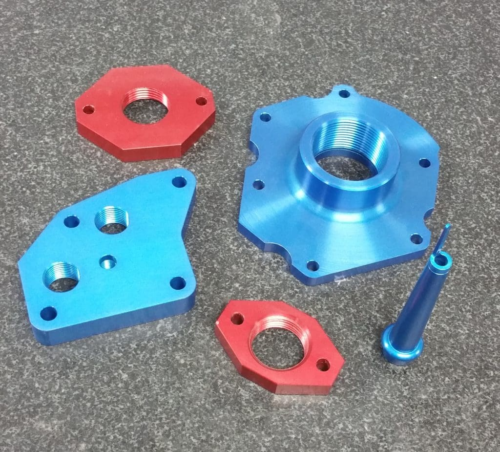The term “precision machining” describes many processes capable of producing highly accurate and precise components using computer numerical control (CNC) technology. Precision machining turns raw materials into precise components using a digital computer-aided design (CAD) file. This file is read by CNC equipment that uses it to carry out the manufacturing process. Compared to standard CNC machining, which can typically meet tolerances of 0.008’’ or 0.005’’, precision machining can achieve tolerances of 0.001’’ or better.
Types of Precision Machining
There are many CNC machining processes that can be used to create highly precise components. Some of the most widely used types of precision machining include:
- CNC Turning. CNC turning machines are available in 3, 4, and 5-axis varieties and work by rotating the raw material while tools remove portions to create the desired shape. The tooling is mounted on a turret that is computer-controlled.
- CNC Milling. Milling machines are available in 2 to 5-axes and cut along different angles. There are several types of differently oriented CNC milling machines, but all types perform subtractive processes to transform raw material into a precise component.
- CNC Swiss Turning. CNC Swiss turning produces extremely small parts accurately and quickly. In this process, only the portion of the material being machined enters the tooling area while the remainder is held securely for maximum precision. The workpiece moves along a Z-axis while turning as tools cut into the material.
- CNC Vertical. Vertical lathes feature vertically-oriented spindles and move the workpiece up or down to align it with the tools. This equipment is best suited for components that focus on a single side, such as a large metal plate.
- CNC Horizontal. Horizontal lathes use a variety of heads mounted onto a horizontal arbor. They work well with a wide variety of workpiece shapes and sizes. Most horizontal lathes can accommodate automatic bar-stock feeders.
Precision Machining Benefits and Applications
There are many benefits to choosing precision machining processes. For example, precision machining delivers significant cost savings over other production methods. Since it is highly precise, it produces less waste and optimizes material usage. Additionally, the computer-controlled process eliminates the risk of human error.
Another significant benefit of precision machining is that its efficiency allows for the production of highly repeatable parts at fast speeds. Since these processes require such little human involvement, it is much safer than other manual manufacturing techniques.

The applications for precision machined components span many industries. For example, the aerospace and medical industries both require machined components to be as precise as possible, as human lives are at risk by even the smallest inaccuracy. The automotive and electronics industries also rely on precision machining techniques.
Materials Used in Precision Machining
A wide selection of materials can undergo precision machining processes. Some of the most commonly used substrates include:
- Aluminum. This material features many benefits, including cost-effectiveness, corrosion resistance, and lightweight.
- Brass. Brass is easily machinable and economical.
- Bronze. Bronze offers excellent heat and electrical conductivity.
- Copper. This material is ideal in applications requiring electrical conductivity.
- Carbon steel. Carbon steel is highly durable and strong.
- Plastic. Plastic offers an inexpensive and non-conductive option.
- Titanium. This material features an excellent strength-to-weight ratio as well as high heat and corrosion resistance.
- Stainless Steel. Stainless steel is sought after for its durability and high strength-to-weight ratio as well – this makes it possible to machine thinner materials.
- Tool Steels. Customers looking for parts that feature abrasion, wear, and deformation resistance will find tool steels (which are typically compositions of carbon and alloy steels) to be a great choice.
CNC Precision Machining at Lansco Manufacturing
There are many benefits to choosing precision machining processes, especially when manufacturing complex components that require a high degree of accuracy. Since there are so many types of precision machining available, these processes can meet the needs of nearly any application or industry.
Lansco Manufacturing has been providing accurately machined precision components for over 35 years. Our services range from prototyping to large production runs and include a wide selection of value-added services. To learn more about our precision machining capabilities, contact us or request a quote today.

Comments are closed